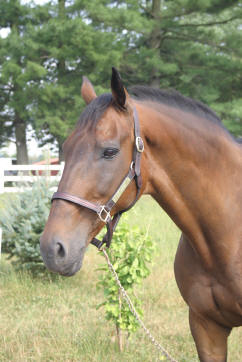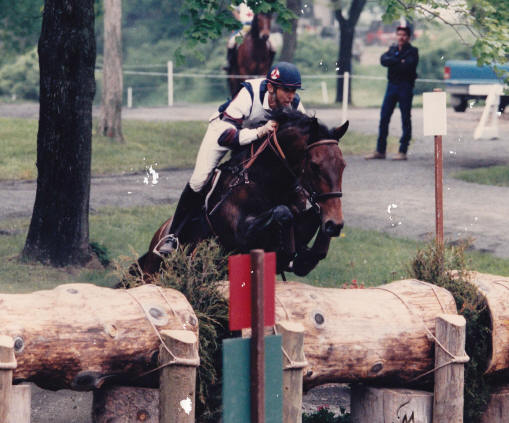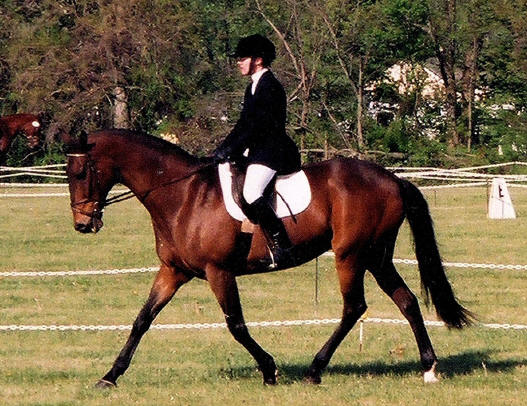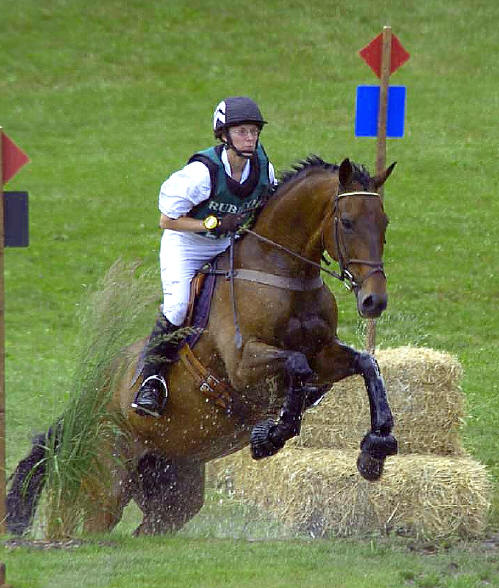|

|
|
Schoolmasters: The horse money can't buy
Michael Hillman
 If I had a nickel for every time I was asked if my old 3-Day horse Lt. Worf was for sale, I'd have enough money for a new horse, a new truck and trailer, plus a night on the town with my wife. But the question always receives the same reply: "Sorry, he's not for sale . . . at any price . . . " If I had a nickel for every time I was asked if my old 3-Day horse Lt. Worf was for sale, I'd have enough money for a new horse, a new truck and trailer, plus a night on the town with my wife. But the question always receives the same reply: "Sorry, he's not for sale . . . at any price . . . "
From a purely business perspective, this answer makes no sense at all. I rarely ride him - at most four or five times a year. With two other horses going, I was not going to be getting on his back anytime soon.
Fortunately for Worf, I'm not in the Equine Business, so he doesn't need to earn his keep anymore. As far as I'm concerned, he's already earned it.
I'll freely admit: Worf spoiled me. He was as honest as they come. Point him to a fence and he would give his all to clear it, ignoring the flurry of cross signals being sent by the out-of-balance rider on his back.
With the help of a great coach who made sure Worf understood the classical language of his combined tasks, I slowly began to understand mine, and soon communication became a two-way street. Riding couldn't have been more fun.

Lt. Worf at the Essex International Three Day Horse Trails
Six years back, we we're getting ready for Radnor International Horse Trails, and everything was going great. He had blown away his competition by winning his last event on his dressage score of 25, but the next morning however, he came up hobbling lame.
On the day I was supposed to be presenting him for the vet's inspection at Radnor, instead, I was watching the surgeons take chips out of his knee. Six months later they had to go in again, and six months after that again. While the first two surgeries were done with the hopes of full recovery, the last was done in hopes of only making him comfortable. Worf couldn't have been happier. He was in the prime of his life and on full disability. In his competition days, we struggled to keep weight on him; now we struggled to keep it off of him. By mid-summer, he looks like a mare in foal.
Five years of rest did wonders for Worf, and had he not started to jump out of the pastures, he'd probably still be in retirement today. But a Schoolmaster isn't a schoolmaster until the other part of the equation is introduced: the rider, and in Worf's case, his charge's name is Jamie.
I first saw Jamie at unrecognized lower level even. Unbeknownst to me, I was standing next to her father as he watched dejectedly as her horse steadfastly refused to jump the ditch. Her face clearly reflected the disappointment of being told she was eliminated. Later, her father sought me out and asked if I knew anyplace they could go to school ditches. To make a long story short, I invited them to my farm. As my current competition horse – Riker - had just finished his season, I got on Worf to give her a lead over the ditch. Worf jumped it so big I almost fell off. Unfortunately for Jamie, her horse refused to follow suit. It took us a while, but we eventually did get her horse to jump the ditch. I meanwhile was having a blast riding my old friend again.
For some reason that still escapes me, Jamie was sufficiently impressed with that day's events to want to return for more lessons. Over the ensuing months, she told me her tale of woe. She had hand-raised her horse and loved him dearly, but he had failed at everything she had tried to do with him. He would jump the moon at home but refused an 'x' in the ring.
I figured the problem could be with Jamie, not the horse. That maybe, just maybe, when she went into the ring, she was freezing, and her horse, sensing her freezing, was taking advantage of the situation. Taking a page from my own life book, I worked the pair over ever increasingly difficult fence in the hopes that once back in the ring, everything would seem so small that the panic that brings freezing would not occur. Unfortunately, I failed to explain this theory to Jamie's horse, and watched in awe as he refused a simple pre-novice stadium fence at a competition, the day after jumping around a course two-foot higher at my house.
No matter what we did, or how hard Jamie worked, her horse always performed flawlessly at home, and like a cow at an event. In desperation, I asked another one of my students, now turning heads at the preliminary level, to try to get Jamie's horse around a course. While it wasn't easy, Becca was nevertheless successful. Figuring I had licked the issue, I had Jamie run the next weekend, naively expecting everything to go well. I couldn't have been more wrong.
Jamie almost got eliminated when her horse refused to even enter the Dressage ring. This setback took the winds out of Jamie's sails, from which she never fully recovered. While stadium started off well, her horse slid to a stop at the third fence and wouldn't go near it again.
As she left the ring our eyes meet, and while she wasn't crying, but you could tell she wanted to. She had done everything I had asked, had worked as hard as she could, all for naught. As I followed her back to the trailer, I couldn't help but wonder what all the setbacks were doing to her self-confidence, not just in riding, but in general. How long I wondered could someone devote their heart and soul to an effort, any effort, only to have their hopes crushed again and again? One didn't need to be a psychologist to know it has to have an effect. It was then that I made up my mind to give her what she needed to get that reward.
"As of now, you are through with showing your horse." I proclaimed back at the trailer.
"But I don't have anything else to ride," she meekly replied.
"Yes you do. You're going to ride Worf." You would have been hard pressed not to see her smile a mile away.
The relationship between classically trained riders and horses is one of a symbiotic nature. While any classically trained rider can get on classically trained horse and perform because they both 'speak' the same language, it takes a skilled, classically trained rider to classically train a horse, and a classically trained horse to train the rider.
Now the mark of a good schoolmaster is not that they will do everything they are asked, but they'll only do it when asked correctly. In other words, schoolmasters know what they are supposed to do; all the rider needs to know is how to ask them to do it - which is where Worf is the best!
I couldn't help but laugh at Jamie's frustration at accomplishing even the most basic of flat work when she first started to ride Worf. Having spent years hand riding a horse that went around in a false frame, Worf refused to go forward unless encouraged by Jamie's leg. For what seemed like weeks, lessons consisted of nothing more than me shouting "leg, leg, leg!" The minute she took her leg off, Worf would drop into a poky walk. As expect, Worf's near instantaneous feedback had its effects, and soon Jamie’s legs were part of her riding equation.
Next Worf and I turned our attention to Jamie's hands, which had only two modes: death grip or drunken county hack. The first time she attempted to take a 'feel' of his mouth, Worf came to a screeching halt - informing her in no uncertain terms that if she wanted the contact, she had better coordinate it with her legs. In many ways, watching Worf teach Jamie was like watching someone learn to drive a car with a clutch. As a bewildered Jamie tried to balance her hands and legs, Worf alternately bolted forward and backed down. And yes, it was Worf who was doing the teaching, patently, day after day, he continued to give honest responses to her hand and leg aids until she was able to master their coordination.

Worf would always put in a flawless test, putting Jamie in the enviable position
of always being in 1st place after Dressage
Once she had sufficiently mastered the basics, I introduced the effect of various leg positions. I'm not sure if her smile on her first successful leg yield on Worf was because she was finally doing a movement she had always wanted to do, or because she understood that Worf was doing it because she was signaling him correctly. In any case, it was time to finally turn our attention to jumping.
Having ridden a stopper for years, Jamie had understandably developed a defense-jumping seat. The very idea of keeping a slight contact over a fence was as foreign to her as an iceberg would be in the Caribbean. Jamie's thrill at successfully clearing their first fence was only equaled by the look on Worf's face which clearly asked, "What in the world are you doing up there?"

Under the author, Worf could always be counted on pulling at least one rail in stadium.
Under Jamie, he never pulled one!
I couldn't help but smile for both of them. "Jamie, Worf's not going to stop on you, so you don't need to throw yourself forward or brace with your hands, just trust him and try to stay with him, let him do the jumping, don't you do it." To Jamie's credit, she followed my advice, and soon the pair was jumping around like a bunch of old pros without a concern in the world. It was finally time to put their teamwork to the test.
Jamie was clearly nervous as she prepared to enter the dressage ring. The last time she had attempted to do this, her horse has a rearing fit. But today was different. While she was remembering the worst, Worf was reliving his glory days and put in a test that even made me drop my jaw. Jamie finally took a breath as Worf came to square halt and bowed his head to the judge; while Jamie had forgotten everything, he had forgotten nothing. It was the same story in stadium and cross-county. Ghost of past performances griped Jamie like a vice, but Worf ignored her goblins and carried on like pro. In doing so, he gave her want she needed most: her first completion and her first blue ribbon ever.
As we drove home from the event, we talked about the event. "Understand Jamie, Worf carried you around today, and that's ok, you were riding on bad memories, but now you have good memories. Next time, ride the horse you're on, not the nightmare horse you were on."
After a summer of hard work and drilling, Jamie's and Worf's fall season was one every coach dreams of; every event was finished on their dressage score. Gone were the blank, lost-in-space dressage performances, replaced by thoughtful and systematic tests that always landed them in the top three. Worf obviously preferred Jamie's style over fences to mine, and never even so much as touched a rail all season. On cross-country, they were like newlyweds on a honeymoon; they couldn't have gotten along better.

For someone who never completed the cross county, Worf was a dream come true
At the last event of the season, I watched in pride as the little girl, who less than a year earlier had been eliminated from an unrecognized event, galloped out of the woods down to a big table jump, cleared it, wheel him about, and gallop away; all the while, both sported grins from ear to ear. I really can't tell you who was having more fun, Worf or Jamie. As the pair raced away, all I could think about was "this is what eventing is supposed to be all about"
The row of blue and red ribbons that now sport Jamie's bedroom wall offer testimony of Worf's and her success. To me, the true measure of Worf’s effectiveness as a schoolmaster came this spring when Jamie mounted my current competition horse, who only I and my coach had ever ridden, and without even so much as a second thought, Jamie successfully put him thoughts his paces.
As we walked back to the barn, I ask her if she realized what she had just accomplished. "Yes, I know, I was able to communicate with him, he understood everything I asked him to do." "Do you know why he understood your aids," I asked. "Yes, because I have a great teacher who taught me how to ride correctly." Turning around, she headed back out to the field and headed for Worf and over her shoulder said, "And I'm going to give him a big kiss and carrot for it ..."
Epilog
The following year, under Worf’s guidance, Jamie would go on to be leading junior rider on the east coast. At the championships, I fondly remembers walking back to the trailer with Jamie after walking cross country, and overhearing another coach point out Jamie to their student, saying: "That’s the girl you have to beat … she’s really good."
I glanced at Jamie, who did her best to pretend that she had not heard the comment, but the smile on her face revealed what she really felt. Yes, Jamie went on to win that day. For years she had been laughed at barns, now she was envied for her riding skills. But Jamie, never once forgot who had got her there – Worf.
Now full of confidence, Jamie went on the following year to prove herself on of my other horse, giving Worf a long deserved time off. Then it was off to collage. While there, Worf came down with Crones disease, which decimated him. In a matter of months he went from the picture of health to death’s door. I called Jamie to let her know. She flew down to see him, and the next day he died.
As I like to say, Worf liked me, but he loved Jamie. He needed to say goodbye to her before he was ready to say goodbye to us.
Remembering Lt. Worf
Read
other horse related stories by Michael Hillman Read
other stories by Michael Hillman |
|